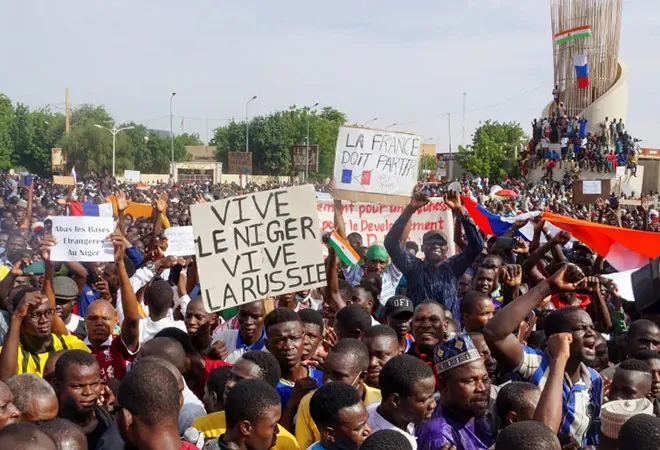
The last few days have seen dramatic changes in the political situation in Niger, which could have much wider implications for the broader regional security situation in Africa. On 26 July, President Mohamed Bazoum of Niger faced a situation where his own presidential guard cordoned off the presidential palace, insisting on his resignation. As days have passed, a coup has been formally declared by the National Council for the Safeguard of the Homeland—under which the security and defence forces have united—on the pretext of “
continuing deterioration of the security situation and poor economic and social governance”.
The unravelling coup in Niger has not just foregrounded the necessity of a democratic ally for the US to fight terrorist threats in the region, but has also marked another step in shrinking US influence in the region.
While it may be too soon to predict the impact on the lives of common people in the country, the coup potentially places the United States (US) in a security muddle. For the US, a faltering security situation in Niger means another step precipitating an already deteriorating security situation in West Africa. The
unravelling coup in Niger has not just foregrounded the necessity of a democratic ally for the US to fight terrorist threats in the region, but has also marked another step in shrinking US influence in the region. Niger is seen as the most
reliable US ally in the fight against al-Qaeda, Islamic State, and Boko Haram.
The Sahel region has seen a rapid consolidation by Islamic militant groups like al-Qaeda and the Islamic State in recent years. The
Global Terrorism Index 2023 points out that in sub-Saharan Africa, the Sahel region has emerged as the epicentre of terrorism, surpassing both South Asia and the Middle East and North Africa (MENA) combined in terms of terrorism-related fatalities in 2022.
Russia has cashed in on the broader anti-colonial angst against France, with French forces having been edged out of other two Sahel countries—Mali and Central African Republic—even as they have ushered in Russia’s Wagner Group.
Another challenge for the US in West Africa has been a great power politics at play between the West and Russia. Russia’s Wagner Group’s involvement in the region has become more obvious in the last few years, particularly since the Russia-Ukraine conflict broke out. Russia has cashed in on the broader anti-colonial angst against France, with French forces having been edged out of other two Sahel countries—Mali and Central African Republic—even as they have ushered in Russia’s Wagner Group. In Niger, protesting mobs have waved Russian flags and attacked the French embassy in signs that Niger could follow in the footsteps of its neighbours. With Niger’s military coup, a vast line of military-ruled states, extending from Guinea in the west to Sudan in the east, could amplify the security conundrum for the West.
US interests
The US calls Niger a
critical partner. US Secretary of State Antony Blinken has extended ‘
unwavering support’ to the president of Niger. The US and Niger have wide-ranging cooperation in areas such as food security, economic development, and military-to-military cooperation. In 2022 alone, the US provided Niger with significant support totalling to more than US
$140 million for development, food security, and humanitarian aid. Additionally, the US announced US
$150 million in aid in March this year.
The US has 1,100 troops deployed in Niger besides two drone bases in the country.
The US has a direct interest in West Africa with its long-standing financial and security support to Niger, a prime regional partner in its counterterrorism and broader regional peace and security efforts in the Sahel. The US has 1,100 troops
deployed in Niger besides two drone bases in the country. The US had escalated counterterrorism efforts in the Sahel in the last few years with the support of Nigerien President Mohamed Bazoum. The most conspicuous example is that of Jeffery Woodke, an American aid worker who was
kidnapped in Niger by an Islamic State affiliate group in October 2016 and was subsequently released in March this year. In October 2017, a US effort to capture an al-Qaeda leader suspected of being instrumental in the kidnapping of Woodke went horribly wrong, leading to the
death of four US soldiers. In the past, there have been quite a few other kidnappings in the region, especially in Niger, Mali, and Sudan. In Mali, a
French journalist went missing in 2021 and
two Canadian diplomats went missing in 2009 only to be released later. These threats are not unique to US presence in the Sahel.
The US security approach to the Sahel region has changed since the killing of US soldiers in Niger in 2017. American commandos provide training to Nigerien special forces at various outposts across the country. However, as opposed to earlier, US soldiers
no longer accompany their Nigerian counterparts in special operations and combat missions, and now offer remote guidance and advice to Nigerien commandos during their operations, maintaining some distance from direct involvement in combat missions.
In Burkina Faso, Guinea, and Mali, US-trained military finally overthrew the civilian governments in these countries. Niger may well be on the cusp of that change.
Niger, after Burkina Faso, Guinea, and Mali, may have extended the loop in a trend where successive West African democratically-elected governments have fallen since 2020 amidst a discordant gap between leaderships put in place by the West and a disgruntled citizenry, often supported by the military. In Burkina Faso, Guinea, and Mali, US-trained military finally overthrew the civilian governments in these countries. Niger may well be on the cusp of that change. Besides cutting aid to Niger, the US has demanded the immediate release of the President of Niger, a key ally in US operations in the region.
The intersections of geopolitics and geoeconomics in the Sahel could keep regional countries as well as great powers like France, US, and Russia engaged in the region. Niger is a uranium-rich country and it is likely that the current stalemate could soon end up as geo-economic grandstanding between Niamey and Paris, the former’s erstwhile coloniser. Already, the military regime in Niger has
banned the export of uranium and gold to France due to the latter’s threats of possible use of force. The US will look to carefully walk between preserving its own interests in the region and a total uproot of French presence in Niger, as the latter would enhance Russian leverage in the country and the broader region. US interests remain tethered to Niger with its core security concerns in the Sahel and with its counterterrorism efforts and its troops that remain spread across the region up to Somalia in the east.
The US troops in Niger have been
restricted to their base. The US’s relations with Niger hinges on how the situation unfolds in the coming weeks. In the US, laws regarding foreign aid restrict most forms of assistance to countries where the democratically-elected leader has been removed through a coup d'état. However, the president can authorise aid if it is deemed to be in the national security interest of the US. The Biden administration has avoided any direct intervention and instead relied on the regional mechanism—Economic Community of West African States—to reverse the coup.
Vivek Mishra is a Fellow with the Strategic Studies Programme at the Observer Research Foundation.
The views expressed above belong to the author(s). ORF research and analyses now available on Telegram! Click here to access our curated content — blogs, longforms and interviews.



 The last few days have seen dramatic changes in the political situation in Niger, which could have much wider implications for the broader regional security situation in Africa. On 26 July, President Mohamed Bazoum of Niger faced a situation where his own presidential guard cordoned off the presidential palace, insisting on his resignation. As days have passed, a coup has been formally declared by the National Council for the Safeguard of the Homeland—under which the security and defence forces have united—on the pretext of “
The last few days have seen dramatic changes in the political situation in Niger, which could have much wider implications for the broader regional security situation in Africa. On 26 July, President Mohamed Bazoum of Niger faced a situation where his own presidential guard cordoned off the presidential palace, insisting on his resignation. As days have passed, a coup has been formally declared by the National Council for the Safeguard of the Homeland—under which the security and defence forces have united—on the pretext of “ PREV
PREV


